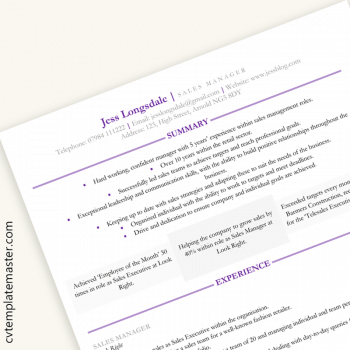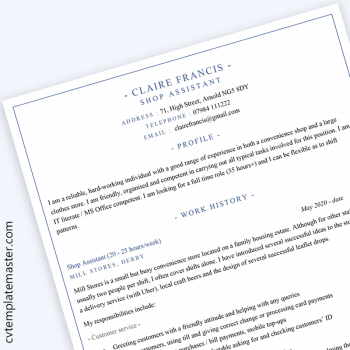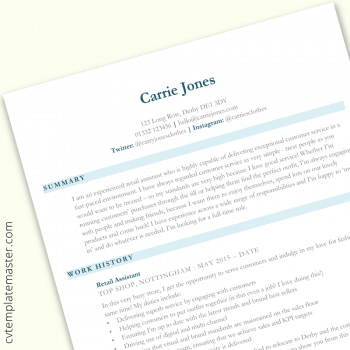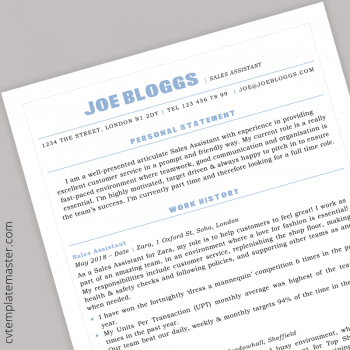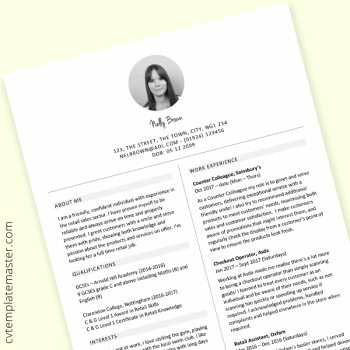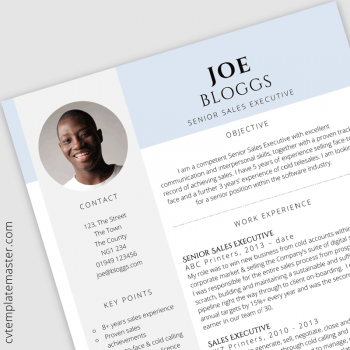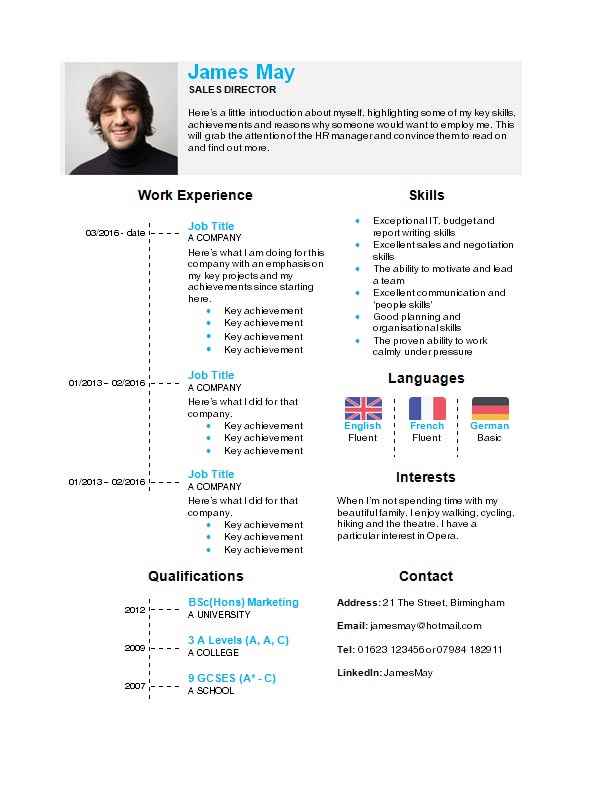How to write a sales CV
Sales CVs are a little different to those written for other roles – they have to do a lot more selling! If you’re going into an organisation claiming that you’re a great salesperson, the recruiter will expect to see evidence of that in your application.To make the very best first impression, follow our step by step guide to writing a sales CV.
1) Name
Your name should be in the format FIRST + LAST followed by any professional letters.
Example: James Smith BA (Hons)
2) Contact information
You should provide:
- Address
- Phone number(s)
- Email address
In addition we recommend creating a professional LinkedIn profile and Twitter account, and including details of these under your contact information. These can be used to offer a more detailed picture of your career history, and to show interest, passion and immersion in your industry.
See our article on building a killer LinkedIn profile to complement your CV.
3) Personal statement
Think of your personal statement as a sales pitch – it’s your opportunity to sell yourself to a prospective employer and should include your best features and benefits. Write it with the job advert in hand, focusing on what’s important to the employer.
The statement should be about 3 – 4 lines long and should make it very clear to the employer that you meet the job spec. Consider which features (skills and knowledge) the employer is asking for, such as the ability to cold call, build relationships and hit your targets.
Explain how you have those features, with examples (in other words, SHOW don’t TELL).
Example 1 job advert

Example personal statement for the above job advert
“I am a competent salesperson with 4 years’ of experience at a technology firm. My current role requires that I bring in new clients, maintaining and building relationships with them to maximise their value to the firm. In the past 12 months I have brought in 6 new customers worth £500k+ plus and in addition through detailed solutions knowledge and exceptional service, I have increased my existing clients’ spend by 25%+. I am highly driven and through hard work and innovation I have exceeded my ever-increasing targets consistently. I also enjoy mentoring junior members who I often invite to shadow me, encouraging and motivating them towards success.”
Example 2 job advert
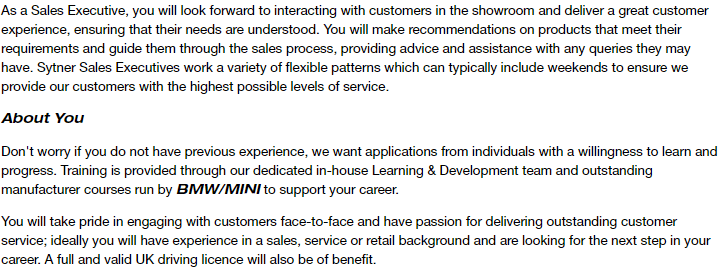
Example personal statement for the above job advert:
“I am a well-presented and well-spoken friendly individual looking for a new challenge in a sales environment. I have over 4 years’ experience providing exceptional service to customers at a busy specialist hi-fi, home cinema and TV shop where I pride myself on having detailed knowledge of the company’s large product catalogue. I have developed the ability to communicate clearly to both technical and non-technical customers, taking the time to understand their needs and exceeding their expectations on every visit. I believe the quality and depth of the advice and service provided is the main reason I exceeded both my individual and team targets consistently.”
The above example shows how someone from a retail background might write an application for a sales role.
4) Achievements (optional)
Not every CV has an achievements section but for a sales CV, including this can help make a big impression. This small section should just summarise some of your best results in your current and/or past roles.
Sales recruiters are always results focused and for that reason your CV needs to be results focused. Using appropriate language helps you achieve this and increases the impact – for example,
- Achieved
- Established
- Exceeded
- Supervised
- Surpassed
See our article on the best words to use on your CV for more details.
5) Work history
Work history should be listed in reverse chronological order (most recent first).
For each position, give:
Name of employer and town/city
Example: JS Smith, Loughborough
Date you started and finished
Example: May 2009 – March 2012, or May 2009 – date
Job title
It’s best to match the title used in the job description, if this means the same thing as your actual job title. This is because ATS software may be used to scan your application and the keywords used in the advert may be expected if you are to pass the screening process.
As an example, if your company has given you the title ‘Business development manager’ / ‘Customer relationship manager’ / ‘New products consultant’ and so on, but your role was actually just sales and you’re applying for a role as a ‘Sales executive’, use that instead.
Very brief description of company
Only provide this if it is not obvious what the company does already.
Example: “JS Smith is a leading manufacturer and B2B distributor of equestrian products.”
Very brief description of duties
Example: “I was responsible for ongoing account management of existing customers and pro-actively seeking new business by targeting a combination of existing and prospective customers in the UK and Ireland.”
Evidence of skills you’d like to demonstrate
When writing your work history, look closely at the job advert and try to provide as much evidence of the skills and experience that are important to this particular employer. If the advert is not very detailed, check out Prospects’ job description of a sales executive as a guide to the required skills and incorporate EVIDENCE of them where you can. This means showing how you have acquired and used a skill, rather than just saying you have it.
As an example, rather than writing ‘I am very good at leading a team’, you could write ‘I lead a team of 8 people through 2017 – 2019 and collectively we exceeded our sales targets by 15% year-on-year.” This provides evidence that you are a successful team leader!
Key achievements (the most important part)
Your achievements need to be specific, explaining what you did, how you did it and what the results were. Don’t simply write, for example, that you doubled the company’s turnover. Some examples of specific achievements are:
- Through cold approaches to customers in the UK and Ireland, I generated £225k of annual recurring revenue in 2016, £301k in 2017 and £300k in 2018.
- Through marketing new products and effective relationship management, I increased my existing clients’ spend by £100k in 2016, £141k in 2017 and £225k in 2018.
Be selective
If you have a lot of work experience, you may need to be selective about what information you give for some roles.
- For relevant older positions (such as junior roles, when you are now a senior), give very brief details and any key achievements.
- For irrelevant positions which helped you build transferable skills, give brief details with examples of where those skills were acquired and used.
- For irrelevant positions where there are absolutely no transferable skills, just provide the Job title, Name of the company and dates worked (mm/yy – mm/yy)
6) Qualifications
Basic qualifications can be useful to demonstrate key skills, such as the ability to write and communicate clearly (English) or the ability to produce clear accurate reports and identify trends (Maths).
However, sales roles are all about results and many employers put less emphasis on qualifications. Instead, they look for the right personality and attitude, valuing commercial awareness, strong communication and of course the ability to close the sale over a formal degree.
For some roles, qualifications relating to the product you sell may be an advantage as you will have more technical knowledge (such as engineering, computing and technology), but often training is provided for ‘the right person’.
Business, management and marketing qualifications can also be an advantage as they typically allow you to see the bigger picture of how the company is run and its customers progress from simply buying a product to becoming a brand advocate.
Many sales people are sent on training courses and if you’re one of thoe, there’s no reason why you can’t include details here, even if they didn’t result in a qualification per se.
7) Skills (optional)
The skills section of your CV is optional, particularly if you’ve already given plenty of good examples in other sections of how you acquired and used the required skills successfully. However, the skills section can still be useful where you’ve not managed to squeeze in the information elsewhere.
Hard skills
Hard skills are definable, specific skills such as use of a particular software program. Examples of skills that may be useful to a sales position include:
- Advanced or technical knowledge of the product
- Ability to use CRM systems
- Intermediate – advanced MS office user (Word, Excel, Outlook)
- Data analysis / the ability to create and interpret reports
- Ability to speak other languages (esp. international sales)
List the hard skills you have and give an indication as to your skill level (basic, intermediate, advanced) where appropriate.
Soft skills
Soft skills are more difficult to measure but no less important. However, don’t make the mistake of simply listing every one that the employer has requested – you’ll simply be taking up valuable space without adding value.
Instead, offer examples of how the skill was acquired and used, together with your level of proficiency where applicable.
Key soft skills for sales roles include:
- Exceptional communication skills
- The ability to sell
- A positive and confident attitude
- A strong resilient character with the ability to cope with rejection
- A high level of self motivation
- The ability to work both independently and as part of a team
You will immediately see how including these skills in your work history is so much simpler. However, sometimes they don’t fit there naturally and so adding them in to a skills section will be necessary. Here are some examples of what you could write:
- I am able to work independently, having done so at XYZ Corp for 4 years (hitting all my targets).
- I developed my ability to work in a team at ABC Corp over 5 years where individually and collectively we exceeded all of our targets consistently.
- I am capable of motivating myself and others, having led a team of fifteen at GHI Corp for 5 years which included training and coaching new junior members, together with mentoring and monitoring weaker team members. We hit our monthly targets consistently and exceeded them at least 3 months each year.
8) Professional memberships (optional)
If you’re a member of any relevant organisations, list them here. This can help demonstrate an interest in and passion for your industry. For example:
- The Institute of Sales Management (ISM)
- The Chartered Institute of Sales and Marketing (CISAM)
- The Association of Professional Sales
- The National Association of Sales Professionals (NASP)
9) Publications (optional)
If you’ve contributed to any articles, whether online or offline, it’s worth including them in a publications section to support industry knowledge and interest.
You can include articles that you have written (for LinkedIn/blogs/websites/magazines) or articles where you’ve given a point of view.
Example: ‘June 2018 – Contributed commentary for Ride on Mower Weekly regarding the new EU product regulations.’
10) Hobbies and interests
This often neglected section can have two valuable purposes:
- To show you take an interest in your health and wellbeing (e.g. fitness/sports activities)
- To further demonstrate valuable skills (teamwork, leadership, creativity etc)
To get the best value out of this section, make sure you include any interests you have which support the above two goals. Avoid anything like ‘socialising’ or ‘spending time with my friends’ both of which also suggest ‘Monday morning hangover’.
11) References
Provide two references, one of which should be your current (or most recent) employer.
12) Recommendations (optional)
A recommendation by an industry professional can be pretty powerful and can give you the edge over your competition. Although recommendations can be included anywhere on your CV, they fit nicely under the references (as they are a sort of reference in themselves). Indeed, the endorsement may come from your references and that’s just fine – it gives the prospective employer a little assurance as to your credibility early on in the hiring process.
You can collect recommendations directly or on LinkedIn – the latter is a bonus as they appear on your profile and may improve your chances of being head hunted. Although you’ll copy them to your CV, they’re also public and verifiable (and therefore more credible). Here’s how to request a recommendation on LinkedIn.
Finally:
As a sales person, remember that your CV sells your brand – so make sure it’s flawless. This means choosing a quality design, printing on quality paper and ensuring there are no mistakes.
